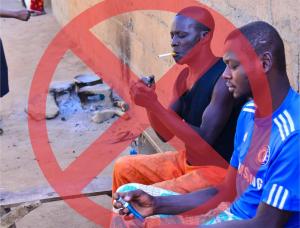Tobacco use ‘snuffs’ out life of over 16,000 annually in Nigeria.
Abuja 31 March 2019 - Abubakar Salau is only 16 years old but receiving treatment at Karu General Hospital Psychiatry ward for his addiction to ‘snuff.’
“I used to mix liquid glue with old tobacco to make my snuff. Whenever I sniffed it, the feeling was surreal,” he says. “Snuff destroyed my life though. I lost so much weight, dropped out of school and hurt members of my family. When I recover fully, I plan to educate teenagers like myself on the dangers of tobacco,” he claims.
Like Abubakar, at least five patients report to Karu General Hospital’s Psychiatry ward every day for treatment of complications arising from tobacco and drug related issues.
“In 2018, nearly 1,680 patients reported to the facility for medical and psychiatric attention” says Dr John Konto, a Psychiatrist in the Behavioural Medicine Unit, Karu General Hospital. He lamented, “Tobacco products, especially when mixed with drugs and other concoctions have severe effects on consumers. Sometimes, cases are so complicated that they even require surgery for full recovery”.
In Nigeria, tobacco use accounts for an estimated 16,100 deaths every year with more than 3.5 million Nigerians (15 years and older) and more than 25,000 children (10-14 years) using tobacco daily.
Nigeria became the 51st country to join the global Protocol to Eliminate Illicit Trade in Tobacco Products (ITP) on 08 March 2019. The Protocol to Eliminate Illicit Trade in Tobacco Products is the first Protocol of the World Health Organization Framework Convention on Tobacco Control (WHO FCTC). The objective of this Convention and its protocols is to protect present and future generations from the devastating health, social, environmental and economic consequences of tobacco consumption and exposure to tobacco smoke.
“For Nigeria, the Protocol when implemented will help curtail illicit trade and access to tobacco products that do not meet required standard. It will also plug leakages in the collection of internal revenue from tobacco products. Ultimately tobacco consumption will reduce in the country.” says Dr Mangai Malau, of Tobacco Control Unit, Federal Ministry of Health (FMoH).
He stresses, “Tobacco consumption poses major health threats in Nigeria as it is compounded by illicit trade. The Government of Nigeria is proactively engaging with relevant stakeholders with the view to deploying digital solutions to track and trace tobacco products along lines of manufacture and supply up to the point of consumption”.
The robust partnership working towards implementation of this Protocol includes the Federal Ministry of Finance, FMoH, Nigerian Immigration Service, Nigeria Customs Service, Standards Organisation of Nigeria (SON), Manufacturers Association of Nigeria (MAN), WHO Nigeria and all Ministries, Departments and Agencies represented in the National Tobacco Control Committee (NATOCC) as well as Civil Society Organizations.
The Protocol to Eliminate Illicit Trade in Tobacco Products was developed in response to the growing scale of illegal trade in tobacco products, which pose serious threats to public health. Illicit trade increases the accessibility and affordability of tobacco products. The negative fallout fuels tobacco epidemic and undermines control policies. It also causes substantial losses in government revenues and contributes to financing of transnational criminal activities.
Dr Clement Peter, WHO Nigeria Officer in Charge (OIC), states, “As Nigeria is party to the WHO FCTC, it is obliged to implement its provisions thus, ratifying the Protocol will serve as a milestone in strengthening global action against tobacco”. He emphasised that WHO will continue to provide technical support to ensure successful implementation of this protocol in Nigeria.
Nigeria signed the WHO FCTC in 2004 and ratified it in 2005. However, to accommodate the provisions of the WHO FCTC, a National Tobacco Control Act (NTCA Act) was enacted in 2015.



